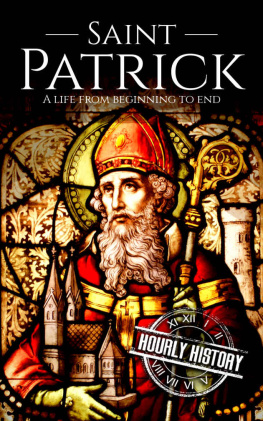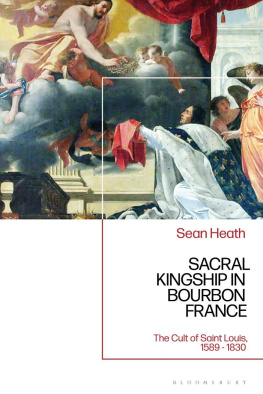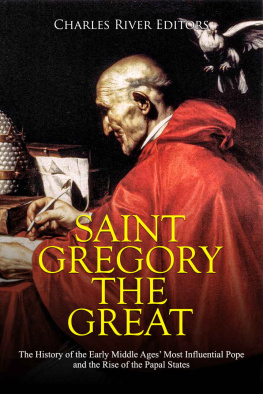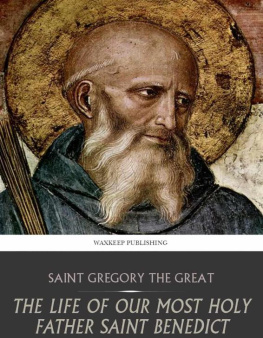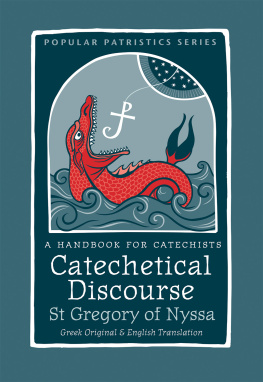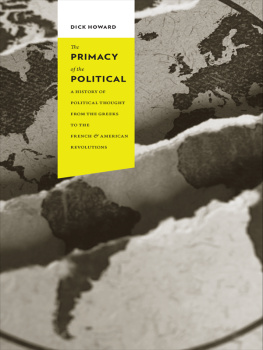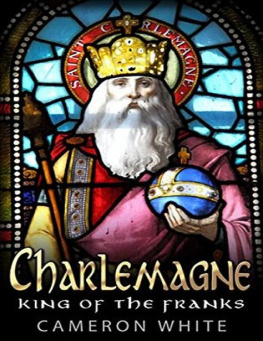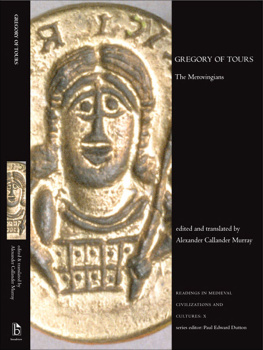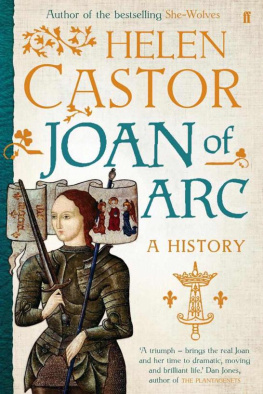Bishop of Tours Saint Gregory - The history of the Franks
Here you can read online Bishop of Tours Saint Gregory - The history of the Franks full text of the book (entire story) in english for free. Download pdf and epub, get meaning, cover and reviews about this ebook. City: Baltimore;France;Harmondsworth, year: 2010;1974, publisher: Penguin Group USA, Inc, genre: Art. Description of the work, (preface) as well as reviews are available. Best literature library LitArk.com created for fans of good reading and offers a wide selection of genres:
Romance novel
Science fiction
Adventure
Detective
Science
History
Home and family
Prose
Art
Politics
Computer
Non-fiction
Religion
Business
Children
Humor
Choose a favorite category and find really read worthwhile books. Enjoy immersion in the world of imagination, feel the emotions of the characters or learn something new for yourself, make an fascinating discovery.
- Book:The history of the Franks
- Author:
- Publisher:Penguin Group USA, Inc
- Genre:
- Year:2010;1974
- City:Baltimore;France;Harmondsworth
- Rating:4 / 5
- Favourites:Add to favourites
- Your mark:
- 80
- 1
- 2
- 3
- 4
- 5
The history of the Franks: summary, description and annotation
We offer to read an annotation, description, summary or preface (depends on what the author of the book "The history of the Franks" wrote himself). If you haven't found the necessary information about the book — write in the comments, we will try to find it.
This colorful narrative of French history in the sixth century is a dramatic and detailed portrait of a period of political and religious turmoil.
The history of the Franks — read online for free the complete book (whole text) full work
Below is the text of the book, divided by pages. System saving the place of the last page read, allows you to conveniently read the book "The history of the Franks" online for free, without having to search again every time where you left off. Put a bookmark, and you can go to the page where you finished reading at any time.
Font size:
Interval:
Bookmark:

THE HISTORY OF THE FRANKS
ADVISORY EDITOR: BETTY RADICE
GREGORY OF TOURS was Metropolitan Bishop of that city from 573 until his death in 594. He was a Gallo-Roman who spoke and wrote sixth-century latin as his native language. On both his mothers and his fathers side he came of distinguished senatorial families. During his episcopate the civil rule in Tours passed from Sigibert to Chilperic and then again to Childebert II, during whose minority Guntram exercised control. Gregory wrote many books. The most famous of them, The History of the Franks, begins with the Creation; but much of it is an eye-witness account of the bloodthirsty behaviour of these four Merovingian Kings and their savage consorts. Gregory was later canonized.
LEWIS THORPE, BA, L-s-L, PhD, D de lU, LLD, FIAL, FRSA, FR HistS, was Professor of French at Nottingham University from 1958 to 1977. He joined the staff of that university in 1946 after distinguished war service. He was President of the British Branch of the International Arthurian Society, and editor of the Societys Bulletin Bibliographique. He was also editor of Nottingham Mediaeval Studies and Nottingham French Studies. He published many articles, and his books include La France guerrire (1945), Le Roman de Laurin, fils de Marques le Snchal (1950), Le Roman de Laurin, text of MS. B.N.f.fr. 22548 (1960), Guido Farina, Painter of Verona, 18961957 (1967) with Barbara Reynolds, Einhard the Frank: The Life of Charlemagne (1970), Le Roman de silence, by Heldris de Cornulle (1972) and The Bayeux Tapestry and the Norman Invasion (1973). He also translated Geoffrey of Monmouth: The History of the Kings of Britain, Two Lives of Charlemagne and Gerald of Wales: The Journey through Wales and The Description of Wales for the Penguin Classics. Lewis Thorpe was a member of the MCC. He died on 10 October 1977.

GREGORY OF TOURS

THE HISTORY OF THE FRANKS
Translated with an Introduction by
Lewis Thorpe
PENGUIN BOOKS
PENGUIN BOOKS
Published by the Penguin Group
Penguin Books Ltd, 80 Strand, London WC2R 0RL, England
Penguin Putnam Inc., 375 Hudson Street, New York, New York 10014, USA
Penguin Books Australia Ltd, 250 Camberwell Road, Camberwell, Victoria 3124, Australia
Penguin Books Canada Ltd, 10 Alcorn Avenue, Toronto, Ontario, Canada M4V 3B2
Penguin Books India (P) Ltd, 11 Community Centre, Panchsheel Park, New Delhi 110 017, India
Penguin Books (NZ) Ltd, Cnr Rosedale and Airborne Roads, Albany, Auckland, New Zealand
Penguin Books (South Africa) (Pty) Ltd, 24 Sturdee Avenue, Rosebank 2196, South Africa
Penguin Books Ltd, Registered Offices: 80 Strand, London WC2R 0RL, England
www.penguin.com
This translation first published 1974
30
Copyright the Estate of Lewis Thorpe, 1974
All rights reserved
Except in the United States of America, this book is sold subject
to the condition that it shall not, by way of trade or otherwise, be lent,
re-sold, hired out, or otherwise circulated without the publishers
prior consent in any form of binding or cover other than that in
which it is published and without a similar condition including this
condition being imposed on the subsequent purchaser
EISBN: 9781101490754
The historian who was to become known to the world as Gregory, nineteenth Bishop of Tours, was born on 30 November c.539,
These rather indigestible details are made the more strange for us by the fact that so many of Gregorys relations were canonized by the Catholic Church, as he was to be himself. What I have given is, however, more than sufficient to prove that in his family there was a long and constant tradition of service to the state and to the Church, even more marked perhaps on his mothers side than on his fathers, and directed more often towards ecclesiastical than lay office, but rewarded by high place in both spheres.
Gregory does not mention his father or mother by name in the History of the Franks. He describes in some detail and with much feeling the murder in 574 of his brother Peter, who was a deacon in Langres. although Eustenia herself is not named.
It is inferred that Gregorys father died while he was still a boy. His mother went to live in Burgundy, where she had property, especially near Cavaillon, Vaucluse, and there Gregory visited her. In 573, when Eufronius died, Gregory, who was by then well-known in the city, was elected to replace him as nineteenth Bishop, and King Sigibert approved the election. Gregory held the bishopric of Tours for twenty-one years, from his consecration on 20 August 573 until his death at the age of fifty-five on 17 November 594.
To become a bishop in Merovingian Gaul in the sixth century was to shoulder great responsibility and to wield great power. Once elected, bishops had security of tenure, and most of them occupied their episcopal thrones until the day of their death. It is true that Praetextatus of Rouen was murdered in his own cathedral, They had many properties to administer, numerous servants to govern
each of whom ruled over a province, and one hundred and eighteen suffragan bishops.
As Bishop of Tours Gregory had special responsibilities. He was Metropolitan of Le Mans, Rennes, Angers, Nantes and four other sees. His cathedral had been burnt down in the disastrous fire which ravaged Tours during the episcopate of his predecessor Eufronius, and it took him seventeen years to rebuild it.
Within the limits of a certain area in Gaul Gregory travelled very widely. We find him in Autun, He never had occasion to leave Gaul, and the journey to Coblenz seems to have been the longest which he undertook.
Gregory is supposed to have been a very small man. There is an apocryphal story that he once visited Gregory the Great in Rome, knelt in obeisance before him and, as he rose, saw the Pope eyeing him quizzically, whereupon he is supposed to have said: It is God that hath made us, and not we ourselves.
As one reads the History of the Franks, certain pleasing peculiarities of Gregorys character and personality strike one forcibly. He was proud of his distinguished relatives, but it was for their sake, not his, for he himself was really the most modest of men. As we have seen, he played a big part in the history of his own times, but he rarely refers to himself; and when he does it is in passing and in deprecating terms. In fact, as he unravels for us the bewildering events of these two decades, he seems to go out of his way to understate his own role. His summing up of his manifold activities in Tours between 573 and 591 is typical. He rebuilt the cathedral and re-decorated Saint Martins church, and that he could hardly omit, for it was common knowledge and the very stones cried out for witness. He discovered, identified, blew the dust off and placed in suitable vantage-points various jars full of putrefying relics. Having related at great length the architectural achievements of his predecessors, he then concludes: In many other places in Tours and its immediate neighbourhood I dedicated churches and oratories, and these I enriched with relics of the Saints. It would be too long to give you a complete list. I handed the man back to Bishop Ragnemod and asked that he might be pardoned. Pardoned, you note, not punished. However hateful may have been his times, this was a lovable man.
Font size:
Interval:
Bookmark:
Similar books «The history of the Franks»
Look at similar books to The history of the Franks. We have selected literature similar in name and meaning in the hope of providing readers with more options to find new, interesting, not yet read works.
Discussion, reviews of the book The history of the Franks and just readers' own opinions. Leave your comments, write what you think about the work, its meaning or the main characters. Specify what exactly you liked and what you didn't like, and why you think so.


